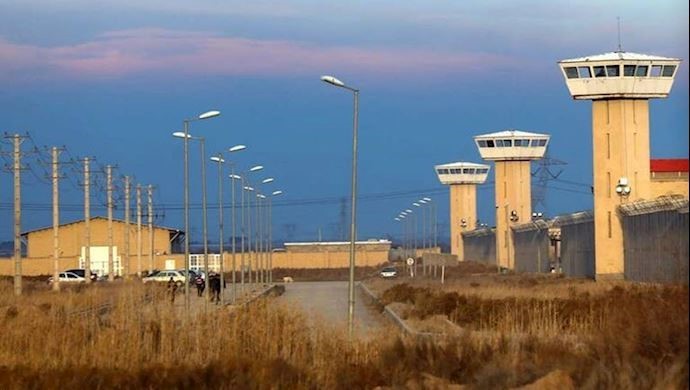Reporting by PMOI/MEK
Iran, February 29, 2020—Reports surfaced earlier this week that Iran’s coronavirus outbreak had reached several prisons, including Gohardasht prison, Evin Prison, Karaj Markazi Prison, Ghezelhesar prison and Orumiyeh prison.
In Tehran’s Fashafouyeh prison a 44-year-old prisoner suspect of being infected to the coronavirus died on Thursday. According reports, criminal prison officials had denied this prisoner’s transfer to the hospital. The prisoner had died of symptoms that were indicative of coronavirus infection, such as severe coughing. The regime is extremely secretive and delusional about the death of inmates.
In Karaj Gohardasht prison coronavirus has spread and prisoners are in disastrous health conditions. They are banned of having any meetings. The prisoners and their families are extremely worried.
The worrying situation of the prisoners and regime’s secrecy and its deceptive measures show the necessity and the need for intervention by the World Health Organization and other international bodies.
The President-Elect of the National Council of The Resistance of Iran Mrs. Maryam Rajavi warned on Wednesday February 28, 2020 that “the outbreak of the Coronavirus in Evin and Gohardasht prisons is a serious danger and I. urge the UN High Commissioner for Human Rights and the Human Rights Council to immediately intervene to save the lives of prisoners and prevent a major humanitarian catastrophe Iran.”
The outbreak of the #Coronavirus in Evin and Gohardasht prisons is a serious danger. I urge the UN High Commissioner for #HumanRights and the Human Rights Council to immediately intervene to save the lives of prisoners and prevent a major humanitarian catastrophe #Iran
— Maryam Rajavi (@Maryam_Rajavi) February 26, 2020
Mrs. Rajavi also warned that “the theatrical instructions by the mullahs’ chief executioner, Ebrahim Rai’si, to secure prisons and prisoners from the Coronavirus is a hoax to cover up this disaster.”
Raisi, who was appointed as the head of the judiciary last year, is among the key players of the 1988 massacre of 30,000 political prisoners, most of whom were supporters and members of the People’s Mojahedin Organization of Iran (PMOI/MEK).
The mullahs' prisons, which are facing a high population density, are at high risk of developing cornavirus due to poor health facilities and poor medical care and inadequate nutrition.
Reports also indicate that prison officials have denied prisoners’ demands to isolate the suspected coronavirus-infected prisoners. In protest, prisoners in Khoramabad and Sanandaj prisons have gone on hunger strike. Another report from Urmia prison shows that regime’s prison agents removed facemasks from the facility and deny providing sanitation goods to the prisoners.
The regime is also arresting people who are exposing its concealing of the coronavirus outbreak, which will increase the population of prisons. More than 140 are arrested in this regard. Ironically, Raisi claimed that he had ordered the judiciary to refrain from giving prison sentences, which is of course false lies and deceit.
The theatrical instructions by the mullahs’ chief executioner, Ebrahim Rai’si, to secure prisons and prisoners from the #Coronavirus is a hoax to cover up this disaster #COVID19
— Maryam Rajavi (@Maryam_Rajavi) February 26, 2020
Background
The poor health conditions of Iran’s prisons are nothing new. Reports in October 2019 claimed that in Karaj Central Prison every prison hall that has the capacity for 200 people is effectively packed by 700 people in each hall by prison authorities. Due to lack of space and beds in cells, many of the prisoners are forced to sleep on the ground and on cardboards.
Prisoners with mental illness and contagious diseases such as hepatitis have been abandoned with no medical care, and they’re mixed with other prisoners, causing the spread of dangerous diseases among the population of the facility.
The situation in other Iranian prisons such as Urmia Central Prison isn’t any better. A prisoner descriped on Jan. 30, 2019 the poor conditions in notorious Evin prison as a hellhole. He wrote: “The wards of Evin Prison are packed with inmates, far higher than the capacity. Twenty to twenty-five inmates are held in one room, most of whom sleep on the floor. The food is very poor in quality. They use soya in the food that is specially made for livestock. The food literally cannot be eaten. There is no sign of vegetables or any protein-rich foods. The inmates are served half-cooked rice and soya on a daily basis.
“In regards to those who become ill, there is literally no medical care. There is not even any medicine or medical care for simple cases of colds. Doctors only visit a very limited number of inmates each day. Each section with 200 inmates are only allowed to send five people for such visits. Even if you are able to be visited there is literally no medicine. Prison authorities say, ‘A noble individual must be found to purchase medicine because the prison has no responsibility in this regard.’





